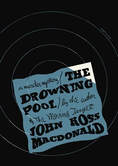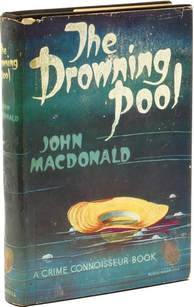
Archer compromises, and introduces himself into Maude Slocum's moneyed world as a talent scout for a movie studio. Maude's socialite husband James is an amateur actor performing the lead in a new play by friend and director Francis Marvell at the Quinto Theatre. While eavesdropping on a rehearsal, Archer witnesses a behind-the-scenes struggle between handsome grifter Patrick Reavis and a teen girl who turns out to be Maude's daughter Cathy. Maude, James, and Cathy are all living on the estate of James's mother, Olivia Slocum, a wealthy woman who is not generous with allowances for anyone, personal or economic.
On the night of a house party, playwright Marvell pulls from a darkened swimming pool the lifeless body of matriarch Olivia, a woman who never went swimming and feared the water. Pat Reavis's cap is found in the bushes nearby, and Reavis himself had legged it off the property right at the crucial time, hitching a ride with Archer into town. The detective finds himself quickly enmeshed in an escalating series of events, as one death begets another and lives built on play-acting and lies bring brutal consequences.

One other detail: Ross MacDonald's writing is indeed so strong and enjoyable that I adopted a reading practice that I had never tried before. For this title, I found the audiobook online but gave myself a 50-page print book lead in the story. I would then listen to recent chapters, a couple at a time, as I read through the book, finishing the pages first and the audio account a close second. This was a really satisfying approach, as the audio let me revisit and appreciate those lines and plot twists as the story was still unfolding. And the lines and twists are worth the review, full of intelligence and cool observation. I end with this example – Max C. includes the same paragraph in his review – where Archer surveys Nopal Valley, a town that has "benefited" from a landscape-changing oil boom:
The oil wells from which the sulphur gas rose crowded the slopes on both sides of the town. I could see them from the highway as I drove in: the latticed triangles of the derricks where the trees had grown, the oil-pumps nodding and clanking where cattle had grazed. Since 'thirty-nine or 'forty, when I had seen it last, the town had grown enormously, like a tumor. It had thrust out shoots in all directions: blocks of match-box houses in raw new housing developments and the real estate shacks to go with them, a half-mile gauntlet of one-story buildings along the highway: veterinarians, chiropractors, beauty shops, marketerias, restaurants, bars, liquor stores. There was a new four-story hotel, a white frame gospel tabernacle, a bowling alley wide enough to house a B-36. The main street had been transformed by glass brick, plastic, neon. A quiet town in a sunny valley had hit the jackpot hard, and didn't know what to do with itself at all.
 RSS Feed
RSS Feed